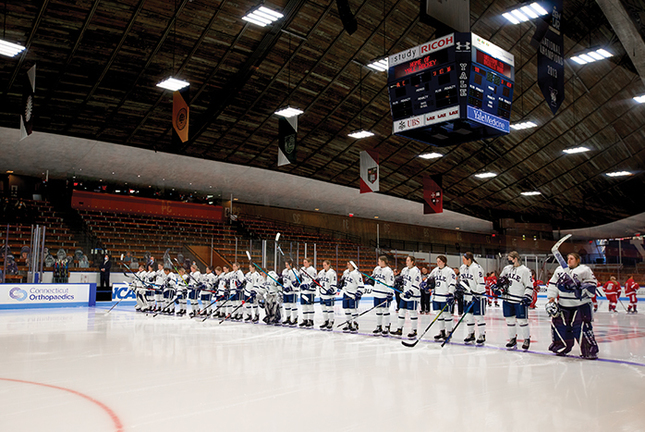
Bob Handelman
Due to COVID restrictions, the women’s ice hockey team played in a nearly empty Ingalls Rink back in January. As the COVID rules were relaxed—and the team kept winning—the crowds got bigger.
View full image

Bob Handelman
Due to COVID restrictions, the women’s ice hockey team played in a nearly empty Ingalls Rink back in January. As the COVID rules were relaxed—and the team kept winning—the crowds got bigger.
View full image
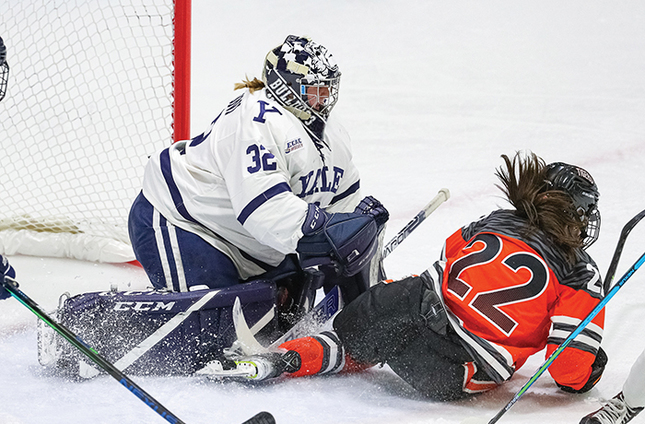
Rob Rasmussen
Gianna Meloni ’22 (in the ECAC semifinal game against Princeton) was a top-ten goaltender nationally throughout the season.
View full image

Rob Rasmussen
Gianna Meloni ’22 (in the ECAC semifinal game against Princeton) was a top-ten goaltender nationally throughout the season.
View full image
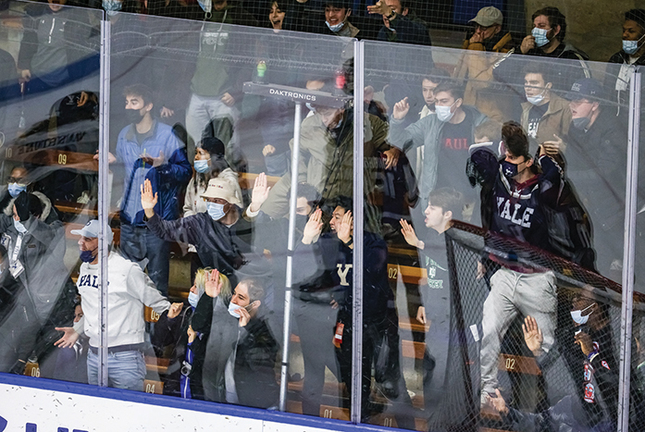
Rob Rasmussen
Fans who cheered the Bulldogs on at the ECAC championship at Ingalls Rink saw a tough loss to Colgate. In a rematch just a week later, the team bested Colgate to earn its place in the Frozen Four.
View full image

Rob Rasmussen
Fans who cheered the Bulldogs on at the ECAC championship at Ingalls Rink saw a tough loss to Colgate. In a rematch just a week later, the team bested Colgate to earn its place in the Frozen Four.
View full image
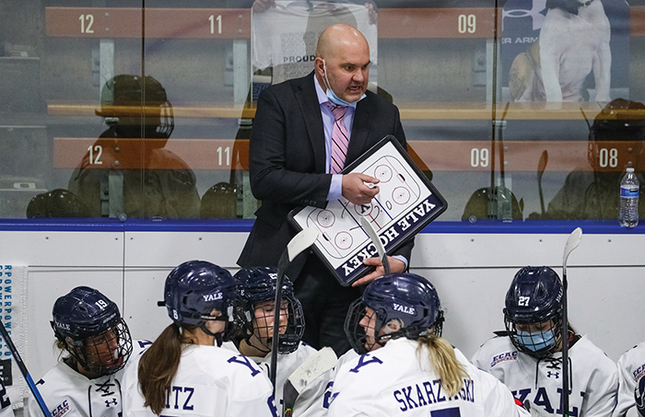
Rob Rasmussen
The team’s turnaround began with coach Mark Bolding, who led the Bulldogs to their first winning season in 13 years during 2019–20--his first year at Yale.
View full image

Rob Rasmussen
The team’s turnaround began with coach Mark Bolding, who led the Bulldogs to their first winning season in 13 years during 2019–20--his first year at Yale.
View full image
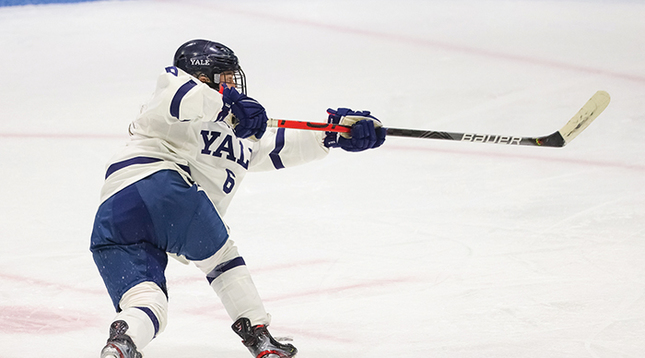
Rob Rasmussen
In action at the NCAA tournament against Colgate, defenseman Emma Seitz ’23, Yale’s second-ever women’s All-American in ice hockey.
View full image

Rob Rasmussen
In action at the NCAA tournament against Colgate, defenseman Emma Seitz ’23, Yale’s second-ever women’s All-American in ice hockey.
View full image
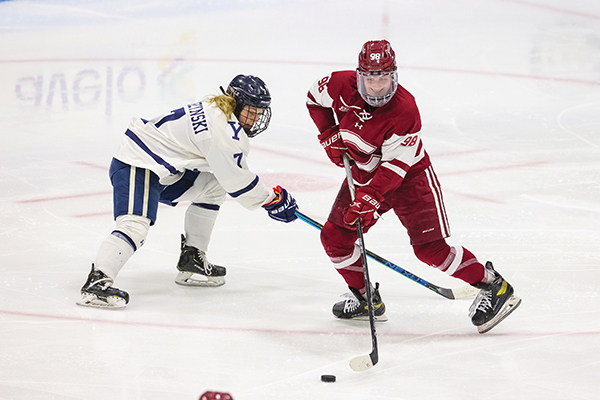
Rob Rasmussen

Rob Rasmussen
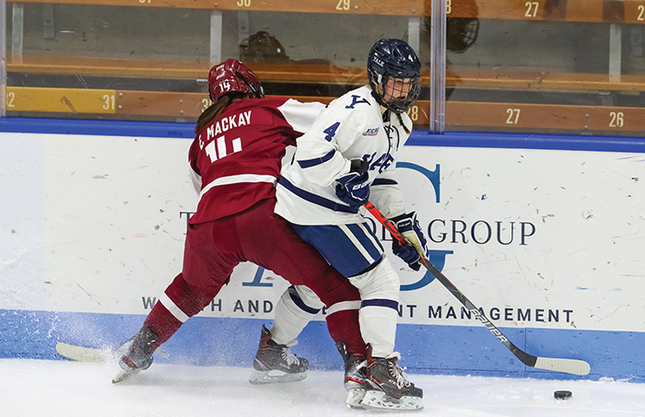
Rob Rasmussen
Elle Hartje ’24, who led the team in scoring.
View full image

Rob Rasmussen
Elle Hartje ’24, who led the team in scoring.
View full image
In their first-ever NCAA Tournament game, the Yale women’s ice hockey team found themselves in a familiar spot. Tied 1–1 against Colgate at the Raiders’ home rink in Hamilton, New York, the Bulldogs were headed to overtime for a spot in the Frozen Four.
Just a week earlier, Yale and Colgate had faced off at Ingalls Rink in the ECAC Championship. After a 1–1 tie sent that game into overtime, Colgate scored an overtime heartbreaker to take the ECAC title. Serendipity—and the computer algorithm that determines NCAA Tournament seeding—pitted the two opponents against each other again, and Yale took full advantage of the opportunity for revenge. Just two minutes into overtime, Tess Dettling ’22 powered through the game-winning goal to send the Bulldogs to a national semifinal game and the upper echelons of college hockey.
The Frozen Four appearance marked a stunning rise for the Yale women’s hockey program—one of the nation’s first women’s collegiate teams when they made their debut in 1975. It took 25 years after that for the NCAA to recognize women’s ice hockey as an officially sanctioned sport. The first NCAA women’s tournament, at the end of the 2000–01 season, consisted of only four teams. As the number of teams has expanded to more than 40, so has the tournament, jumping to eight teams and then eleven for the 2021–22 season.
The women’s program had languished for decades, despite Yale’s deep relationship with the sport. Prior to the 2019–20 season, the Yale women had last completed winning seasons in 2005 and 2007. Before then, you’d need to look back to 1986 for a season finished over .500. Until this year, Yale was the only hockey-playing Ivy to have never made the NCAA Tournament, and one of just a few teams active since its inception to have never qualified. “We know what it’s like to be on a losing team and go through a tough season,” says Emma Seitz ’23, who began playing for Yale in 2018. “When I committed, I wasn’t expecting the hockey team to be something that it wasn’t at the time.”
Despite the lack of team success, the program still produced a number of history-making players, including All-American Laurie Belliveau ’98, bronze-winning US Olympian Helen Resor ’09, and three-time Olympian Phoebe Stänz ’17, who won a bronze medal as a member of the Swiss team in 2014. And the team continues to play in the memory of Mandi Schwartz ’10, whose fight against leukemia inspired a worldwide program that registers bone marrow donors. She is the namesake of the ECAC’s Student-Athlete of the Year award for women in hockey.
The turnaround at ingalls rink began in 2019, with the hiring of Mark Bolding as the Susan Cavanagh Head Coach. Bolding arrived at Yale after a dominant 12-year stint as the women’s coach at his alma mater, Norwich University, in Northfield, Vermont. He was Norwich’s inaugural coach when the varsity team debuted in 2007, and he led the Cadets to two Division III national championship titles and three other title game appearances. “My plan—leaving a place where I was pretty comfortable and having success—was to try and do it here,” says Bolding. “Easy to say, tougher to do.”
But with the seasoned Bolding on board, the shift in performance was almost immediate. The Bulldogs kicked off their 2019–20 season with a three-game winning streak, which they followed up with six straight wins in January 2020. Yale ended the season on March 1 with 17 wins and 13 conference victories, both school records. Momentum came to a halt just days later with the spread of the COVID-19 pandemic. Nearly 20 months would pass before the Bulldogs would play another game.
However, the success of the first season under Bolding’s leadership had already given the team a glimpse of their potential. “He set the expectation that, just because we’re at Yale, it doesn’t mean we can’t be great hockey players as well as great students,” said captain Greta Skarzynski ’22 before the Frozen Four began. Together, almost every returning student-athlete chose to take a leave of absence to preserve their remaining eligibility, and nearly all of Bolding’s 2020 recruits deferred their enrollment. “We believed that if we all did this, the rest of our careers would be better,” says Seitz, the daughter of former men’s player Greg Seitz ’90. That meant that the 2021–22 roster featured the return of the seven top scorers, a starting goalie, and an astounding 13 first-year players, who alone made up nearly half of the 29-women roster.
The mix of new talent and a lengthy absence from the ice might, understandably, have led to a slow start. But the Bulldogs picked up right where they left off—and with extra firepower. “A lot of people would think that [absence] would set us back, but it just made us that much closer,” says Skarzynski. In the first two games of the year, the team scored 15 goals in two shutout victories, with nine different players tallying goals as part of the blowouts. And after two losses—the only time in the entire season that the team dropped consecutive games—the Elis then put together a seven-game unbeaten streak against a slew of ECAC opponents, putting them at 8–2–1 after their first 11 games.
That’s when the hockey world started to take notice. Four games into the streak in mid-November, the Bulldogs earned their first-ever national ranking (No. 9) in the USCHO.com poll; one week later, they were also ranked in the USA Hockey Magazine poll (No. 7). They would remain on both lists through the end of the season, rising as high as No. 5 and No. 4, respectively. “They pretty much rolled through the year without much of a hiccup,” says Bridgette Proulx, the play-by-play voice for the Yale team on ESPN since 2019. “That’s rare for a team.”
Victories were not only plentiful but were also often decisive, with scores such as 7–0, 6–0, and 5–1 becoming commonplace. Yale finished the season outscoring their opponents 123 to 55; they ranked among the top ten in goals per game and had the third best power play in the nation. Elle Hartje ’24 led the team with 51 points, among the highest in the country, including a school-record 35 assists. She, along with Seitz, who herself was the top scoring defender in the ECAC, became just the fourth and fifth all-ECAC first-team selections in the program’s history.
That offense was paired with a top-five defense and the nation’s third-best penalty kill. Gianna Meloni ’22 was a top-ten goaltender nationally throughout the season; she ended the season with the lowest goals-against average of any regularly starting goalie in school history.
Most importantly, good spirits had returned to Ingalls Rink. Describing the team before the Frozen Four, Bolding said, “They’re quick, they’re close, they’re competitive, and they smile a ton. There’s a lot of happy Bulldogs coming into the rink every day.” Seitz later added, “Hockey’s supposed to be fun! And I think it’s fun!” Bolding concluded: “It’s a foundation. You have to build it over time. Our house just took a little longer to build, and we want to make it a nice one.”
At the end of the regular season, yale took second place in the ECAC standings, just one point behind Harvard. Although they lost to Colgate in the ECAC Championship, it was already clear that the Bulldogs would make their first NCAA Tournament with an at-large bid. Under the new 11-team format, Yale was seeded fifth, giving the team a spot in the quarterfinals. The Bulldogs’ overtime vindication against Colgate sent them to the Frozen Four with a serious opportunity to win the national title.
In the national semifinal, held on the campus of Penn State, the Bulldogs faced Ohio State, who entered the Frozen Four as the country’s top team. With just six losses on the year, the Buckeyes had the best offense in the country. But Yale showed it could hang tough despite an onslaught of Ohio State scoring opportunities, skating to a draw in the first period, and then putting the first goal on the board early in the second period. As Yale crashed the net, Tabea Botthof ’23 slammed a rebounding puck through traffic for only her second goal of the year.
As the game’s pace increased, Yale almost found the net again off multiple rebound chances, and kept that momentum until Ohio State went on a power play. Then, the nation’s top power-play team scored less than a minute into their advantage, followed by another Buckeye goal just a few minutes later to make it 2–1. Despite an evenly matched effort from the Bulldogs in the third period, and a game in which Meloni tallied a season-best 36 saves, the Buckeyes held on to win, 2–1.
“We’re a little bit new to this,” said Bolding afterward. “But not only did we show up, we made some noise.”
Yale would finish the season 26–9–1, easily breaking all its past major team records: most wins (by 9), most single-season goals (by 27), assists (by 36), and points (by 66!). In just his second year, Mark Bolding was named the national coach of the year, his first at the Division I level, and his fifth including Division III honors. “Doing anything a Yale team has never done before means a lot, because that’s 50 years of history,” says Seitz. “Those are all amazing women that put their blood and time and energy into this women’s hockey program, so anything we can do to honor that past is very meaningful.”
After decades of struggle, Yale women’s hockey has finally found a way to mix a winning culture with championship-caliber play. “The atmosphere in the locker room is just different,” said Meloni after the Frozen Four loss. “I think that’s how it’s going to be for a long time.” And next year, it’s all about taking advantage of the program these players have built, with all but five players returning for another shot. “College hockey is definitely the pinnacle of women’s hockey in the world.
The games are just amazing, the practices are amazing, and our team is at such a high level even internally,” says Seitz. “It’s going to be fun to be on a team that has goals and high expectations—which is going to be new.”
 loading
loading